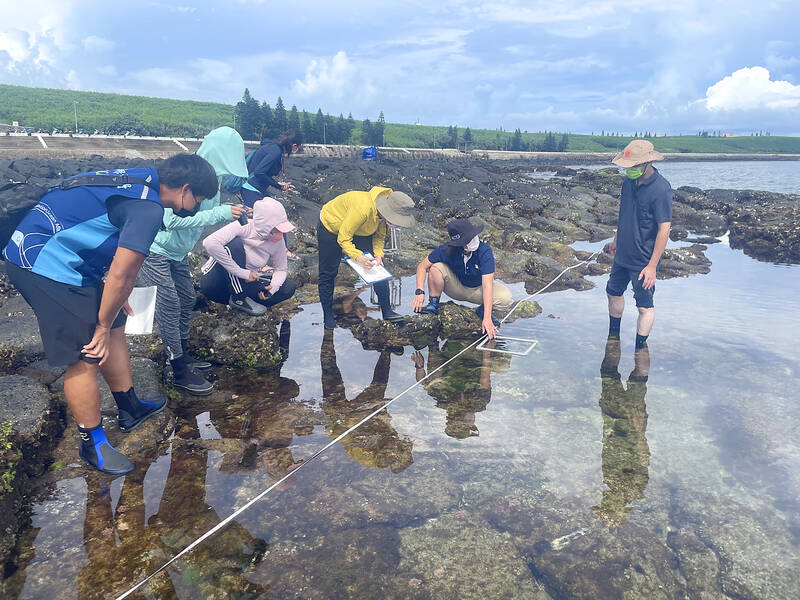About half of the nation’s marine protected areas are completely or highly protected, the Ocean Conservation Administration (OCA) said on Friday, as it aims to meet international conservation goals.
The findings were from a comprehensive survey last year of all 45 protected marine zones around the nation, conducted for the first time in the agency’s history, it said in a statement.
Among them, seven were considered “completely protected,” while 18 were “highly protected,” it said.

Photo courtesy of the Ocean Conservation Administration
Nine were “moderately protected” and 11 had a low level of protection, it added.
The seven completely protected areas were Indo-Pacific humpback dolphin habitats along the west coast, Kenting National Park, Dongsha Atoll National Park, South Penghu Marine National Park, Wanghaixiang Chaojing Bay, the Fushan Aquatic Organisms Propagation and Conservation Zone, and the Penghu South Sea Columnar Basalt Nature Reserve.
These reserves have comprehensive management plans, regular ecological surveys and complete fishing bans, the OCA said.
The poorly preserved areas have labor shortages and lack resources to assist with conservation, it said.
The OCA in 2021 surveyed 22 zones after establishing a set of evaluation criteria, it said, adding that last year was the first time it evaluated all 45 areas.
The point of the survey was not to give points to each area, but to better understand the state of management in the nation’s marine protection areas to serve as a basis for improvement, it said.
For example, after the Shitiping Aquatic Organisms Propagation and Conservation Zone off Hualien County received a poor rating in 2021, the OCA and local communities worked together to draft a plan, and to conduct a survey and patrols for giant clam populations, it said.
The Keelung City Government cooperated with the OCA to conduct patrols in the Keelung City Aquatic Plants and Animals Conservation Area, significantly improving oversight, it added.
The UN Convention on Biological Diversity last year adopted a goal to protect 30 percent of the ocean by 2030, which Taiwan is striving to achieve, OCA Director-General Huang Hsiang-wen (黃向文) said.

‘DENIAL DEFENSE’: The US would increase its military presence with uncrewed ships, and submarines, while boosting defense in the Indo-Pacific, a Pete Hegseth memo said The US is reorienting its military strategy to focus primarily on deterring a potential Chinese invasion of Taiwan, a memo signed by US Secretary of Defense Pete Hegseth showed. The memo also called on Taiwan to increase its defense spending. The document, known as the “Interim National Defense Strategic Guidance,” was distributed this month and detailed the national defense plans of US President Donald Trump’s administration, an article in the Washington Post said on Saturday. It outlines how the US can prepare for a potential war with China and defend itself from threats in the “near abroad,” including Greenland and the Panama

The Chinese Nationalist Party (KMT) is maintaining close ties with Beijing, the Democratic Progressive Party (DPP) said yesterday, hours after a new round of Chinese military drills in the Taiwan Strait began. Political parties in a democracy have a responsibility to be loyal to the nation and defend its sovereignty, DPP spokesman Justin Wu (吳崢) told a news conference in Taipei. His comments came hours after Beijing announced via Chinese state media that the Chinese People’s Liberation Army’s Eastern Theater Command was holding large-scale drills simulating a multi-pronged attack on Taiwan. Contrary to the KMT’s claims that it is staunchly anti-communist, KMT Deputy

RESPONSE: The government would investigate incidents of Taiwanese entertainers in China promoting CCP propaganda online in contravention of the law, the source said Taiwanese entertainers living in China who are found to have contravened cross-strait regulations or collaborated with the Chinese Communist Party (CCP) could be subject to fines, a source said on Sunday. Several Taiwanese entertainers have posted on the social media platform Sina Weibo saying that Taiwan “must be returned” to China, and sharing news articles from Chinese state media. In response, the Mainland Affairs Council (MAC) has asked the Ministry of Culture to investigate whether the entertainers had contravened any laws, and asked for them to be questioned upon their return to Taiwan, an official familiar with the matter said. To curb repeated

Taiwan People’s Party (TPP) Chairman Huang Kuo-chang (黃國昌) yesterday appealed to the authorities to release former Taipei mayor Ko Wen-je (柯文哲) from pretrial detention amid conflicting reports about his health. The TPP at a news conference on Thursday said that Ko should be released to a hospital for treatment, adding that he has blood in his urine and had spells of pain and nausea followed by vomiting over the past three months. Hsieh Yen-yau (謝炎堯), a retired professor of internal medicine and Ko’s former teacher, said that Ko’s symptoms aligned with gallstones, kidney inflammation and potentially dangerous heart conditions. Ko, charged with